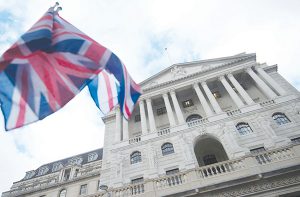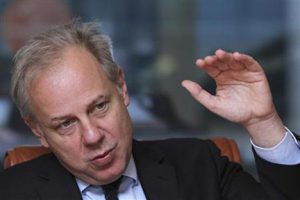The Bank of England (BOE) would have preferred to have had more to celebrate on the 25th anniversary of its independence earlier this month. The central bank’s Monetary Policy Committee has one goal, to which everything else is subordinate: to keep overall consumer inflation at 2%. But it has been a year since the inflation rate was that low and the story since then has been one of a remorseless and dramatic rise. Consumer-price inflation is now 9%. The bank forecasts that it will top out at 10%. Perhaps, though overall wages rose by 7% in the first quarter, adding to inflationary pressures.
BOE Governor Andrew Bailey and a few of his colleagues were summoned before the Treasury Select Committee of the House of Commons to explain the failure to contain inflation. “Not our fault,†was the gist of the answer. Bailey claimed — wrongly — that 80% of the price increases were beyond the MPC’s control. Dramatic supply shocks driving up the costs of energy and traded goods could not have been predicted, and there wasn’t much the bank could do about them anyway. Nor could the MPC have realised that the UK labour market was as tight as it has turned out to be. Anyone claiming otherwise is doing so with the benefit of hindsight.
Really? Plenty of credible voices said inflation was about to surge. Mervyn King, who headed the BOE from 2003 to 2013 and is
a fellow contributor to Bloomberg Opinion, wasn’t shy in saying that central banks made a mistake by printing too much money.
But behind this money splurge lie fundamental problems about what central banks are trying to achieve. Like his central bank colleagues around the world, Bailey gripes that the BOE can’t and shouldn’t do anything about unpredictable and adverse supply shocks. I would have more sympathy for this argument were it not to display both breathtaking inconsistency and an unwillingness to state the obvious: targeting overall inflation is dumb.
Bailey is right in that central banks have little control over a big driver of the big swings in overall inflation for developed world countries in the past few years, which is rapid changes in the price of traded goods and energy. This accounts for about a third of UK inflation. From shortly after the end of the global financial crisis to mid-2020, global traded goods prices fell in a fairly consistent manner due to declining export prices from Asia in general and China in particular. That is why UK inflation was nearly zero in 2015.
Domestic inflation — the bit that central banks have far more control over — was stable. From 2014 to 2019, for example, UK services prices drifted between 2% and 3%, a bit lower than the roughly 3% to 5% range of the previous couple of decades. Services prices in the US and the euro zone were similarly stable, albeit a bit higher and lower, respectively.
To be even the slightest bit consistent with their present argument, you might have expected central banks to have looked through this benign imported inflation. They didn’t. The BOE kept the base rate at 0.5% from the global financial crisis until 2016, when it cut it to 0.25%. In 2020, it slashed the rate to zero and, like every other big central bank, hugely ramped up quantitative easing. Simply put, the BOE and other central banks spent many years leading up to the current inflationary surge trying to drive up overall inflation to counter the effects of a huge and altogether beneficial positive supply shock over which they also had no control and to which they shouldn’t have reacted. Of course, their reactions to the Covid-19 pandemic were out of concern of a demand shock. Nevertheless, their armory was so bare precisely because central banks had been targeting overall inflation.
This monetary policy strategy has been far from costless, quite apart from helping to spur the present inflationary surge. For one thing, central banks built up an entire experimental monetary structure from which they are finding it very hard to extricate themselves. Supertankers can’t instantly change direction. For another, this policy drove asset prices to levels at which investors were pretty much guaranteed to lose money, especially as inflation rates climbed. This is what has been happening over the past few months.
Were central banks to have targeted only domestic inflation — an index of non-traded goods and services, for example — interest rates would at least have been a lot higher across the developed world and I doubt that they would have done anything like the same amount of QE.
Scrapping targets altogether would be better still, as all have their flaws. Central banks should be given a much broader and vaguer remit of protecting the internal and external value of their currencies. They should also rely less on economists and more on people with far more experience in financial markets.
And they should ditch the idea that their actions should be predictable and transparent, since both encourage leverage and risk taking. None of this would have solved the present problems, but we would have started in a better place.
—Bloomberg
Richard Cookson was head of research and fund manager at Rubicon Fund Management. Previously, he was chief investment officer at Citi Private Bank and head of asset-allocation research at HSBC
 The Gulf Time Newspaper One of the finest business newspapers in the UAE brought to you by our professional writers and editors.
The Gulf Time Newspaper One of the finest business newspapers in the UAE brought to you by our professional writers and editors.

